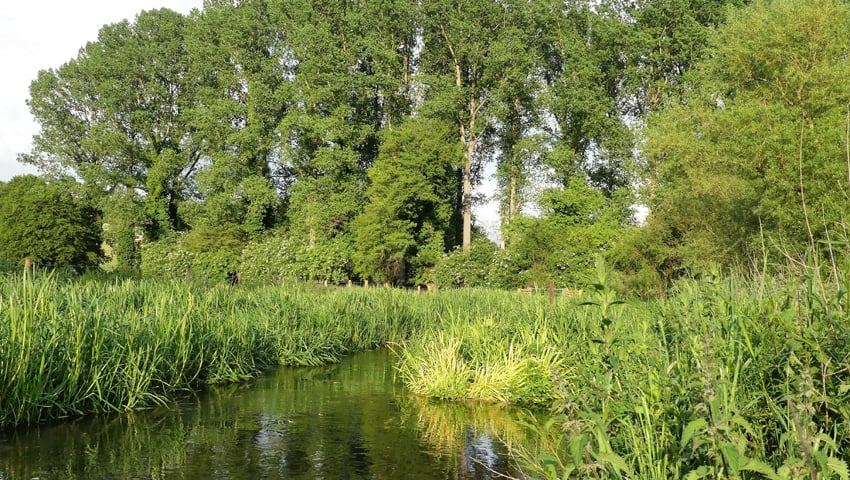Farmers from the Environmental Farmers Group (EFG) have joined forces with Rothamsted Research to help improve river health and deliver other positive environmental outcomes.
The partnership helped EFG members in the Wylye catchment in Wiltshire to design a farmer-led, water quality monitoring scheme, which will help them reduce farm pollution in the river. The collaboration with Rothamsted will be rolled out across other tributaries, establishing on-farm water-testing labs in the Hampshire Avon, Dorset Stour and the iconic Test and Itchen catchments with funding from the UKRI-BBSRC Resilient Farming Futures programme.
As well as standard sampling for nutrients, farmers on the Wylye are using a pioneering low-cost colour analysis of sediment in the river. Samples are tested in the first on-farm lab, sited in a disused farm building, which was originally set up with grants from the Fishmongers’ Company, Codford Biogas and FiPL. The sediment can then be traced back to specific areas and inform management options to improve water quality.
Rothamsted has secured funding to develop an additional eight labs in neighbouring catchments over the next four years. Its Science Director for Net Zero and Resilient Farming, Prof Adie Collins, said, “Working with EFG is a fantastic opportunity for us to disseminate our research and learn together. We discover as much from working with farmers as we do on the campus, that’s the joyous thing about EFG. I look forward to spreading this support on water quality testing and environmental baseline assessments to other EFG groups across the country. This number of farmers working together in a coordinated way has the capacity to make a real difference.”
The EFG, which celebrates its second anniversary this month, is a farmer-owned, farmer-led environmental cooperative designed to help its members access private sector funding for restoring biodiversity loss, getting cleaner water in our rivers and moving to net carbon zero farming by 2040.
It started in the Hampshire Avon catchment, bringing together five existing Farmer Clusters into a proper legal entity, able to deliver more ambitious outcomes by working together. The Game & Wildlife Conservation Trust (GWCT), pioneered the original Farmer Cluster concept, helped establish the EFG and acts as its scientific advisor.
GWCT chief exec and EFG board member Teresa Dent said, “I was delighted to help initiate the EFG, working with farmers in the Hampshire Avon catchment, when first, it became clear they were up for delivering even better environmental outcomes and second, that it was going to be difficult for them as individuals to access and get a fair return from natural capital markets and future green finance. While we welcome the increasing number of options available in the Sustainable Farming Incentive scheme, new forms of funding are going to be important to underpin long-term, inter-generational environmental improvements. This is true of river restoration, where private sector investment will be crucial in supporting farmers to deliver catchment-scale improvement projects.”
The bottom-up approach to the water testing initiative is key to its success. By taking ownership of collecting and managing the data, farmers can avoid being wrongly blamed for pollution incidents and better understand how they can adapt their own operations to improve water quality.
EFG board member Tim Palmer, who helped establish the first on-farm lab on the Wylye, said, “Having oversight from Rothamsted will ensure the scientific credibility of the data so it is accepted by the regulator as robust. The assumption is often made that agriculture is to blame for the vast majority of pollution, but in many cases there are other factors at play such as domestic sceptic tanks or water companies discharging waste. That’s why, as the regulatory framework is ratcheted up, it’s essential to have the data to accurately identify the root of the problem. And it’s not just about testing, it’s about putting the tools in the farmers hands, so they can set the targets, challenge themselves and tackle the problems at source.”
Looking ahead, the water testing has the potential to be rolled out on a national scale. Rob Shepherd, chairman of EFG explained, “Over 400 farmers have joined since we launched and we have set up groups in the Hampshire Avon, Test & Itchen, Dorset Stour, Piddle & Frome, Isle of Wight, Central England and North Lincolnshire. Farmers on Exmoor, rivers further west down to Exeter, east to Sussex, and Shropshire are also expressing interest. I have been amazed at the level of support EFG has generated in two years. We’ve expanded to an area that could represent 17% of England, and we are having conversations with farmers every week that could take it well beyond that.”
